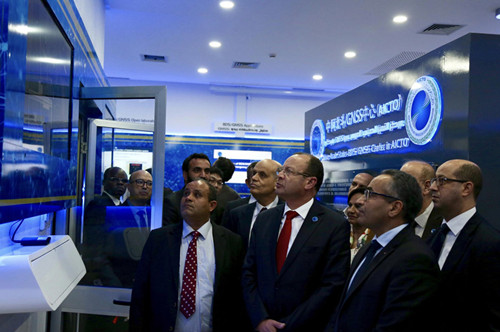Overseas Beidou center set up


Mohamed Ben Amor, secretary-general of the Arab Information and Communication Technologies Organization (front, second from left), tours the China-Arab Beidou System/Global Navigation Satellite System Center in Tunis, Tunisia, on Tuesday. [Photo/Xinhua]
The first overseas Beidou center of excellence, which was established in Tunisia on Tuesday, is expected to boost cooperation in satellite navigation between China and Arab nations, the China Satellite Navigation Office said on Wednesday.
An inauguration ceremony of the China-Arab Beidou System/Global Navigation Satellite System Center was held on Tuesday at the El Ghazala Technological Park in Tunis, capital of Tunisia. The event was organized by the China Satellite Navigation Office and the Arab Information and Communication Technologies Organization, the Chinese office said in a statement sent to China Daily.
The statement said this is the first time such a center has been set up in another country for China's Beidou Navigation Satellite System, adding that the move will gear up the expansion of Beidou-based services in Arab nations.
The center is jointly run by the Chinese office and the Arab organization, and is tasked with demonstrating, promoting and evaluating Beidou's navigation and positioning services in Arab nations. It will also carry out research and training on Beidou, the statement said.
It added that many representatives of Arab and African countries expressed "strong interest" in Beidou, noting that five Chinese experts would give a three-day training session starting on Wednesday at the center to more than 40 satellite navigation professionals from Arab nations.
China and the League of Arab States held the First China-Arab States Beidou System Cooperation Forum in May in Shanghai. The two sides pledged to strengthen their communication and collaboration in satellite navigation and to bring Beidou-based services to Arab states to benefit social and economic development.
Beidou is one of the four space-based navigation networks along with GPS from the United States, GLONASS from Russia and Galileo from the European Union.
Since 2000, when the first Beidou satellite was placed into orbit, 33 satellites have been launched for the network. Beidou began providing positioning, navigation, timing and messaging services to civilian users in China and parts of the Asia-Pacific region in December 2012.
China has planned to put 18 third-generation Beidou satellites into space before the end of 2018.
According to plans from the China Satellite Navigation Office, the network will be made up of 35 satellites before the end of 2020 to give Beidou global coverage. Several now in orbit will be decommissioned by then.
Currently, Beidou covers nearly 30 countries, including Pakistan, Egypt and Indonesia, the office said.
MOST POPULAR
- 1 China to give visa-free treatment to another 9 countries
- 2 China fully opens manufacturing sector to foreign investors in landmark opening up move
- 3 China's import expo attracts record-breaking participating countries, exhibitors
- 4 China's door opening even wider to foreign visitors, businesses
- 5 China revises rules to ease foreign strategic investment in listed firms
Editors' Picks
 Infographic:
China's public holidays for 2025
Infographic:
China's public holidays for 2025
 Infographic:
Basic facts of APEC
Infographic:
Basic facts of APEC
 Infographic:
Wrapping up the 7th CIIE: Data recap
Infographic:
Wrapping up the 7th CIIE: Data recap




